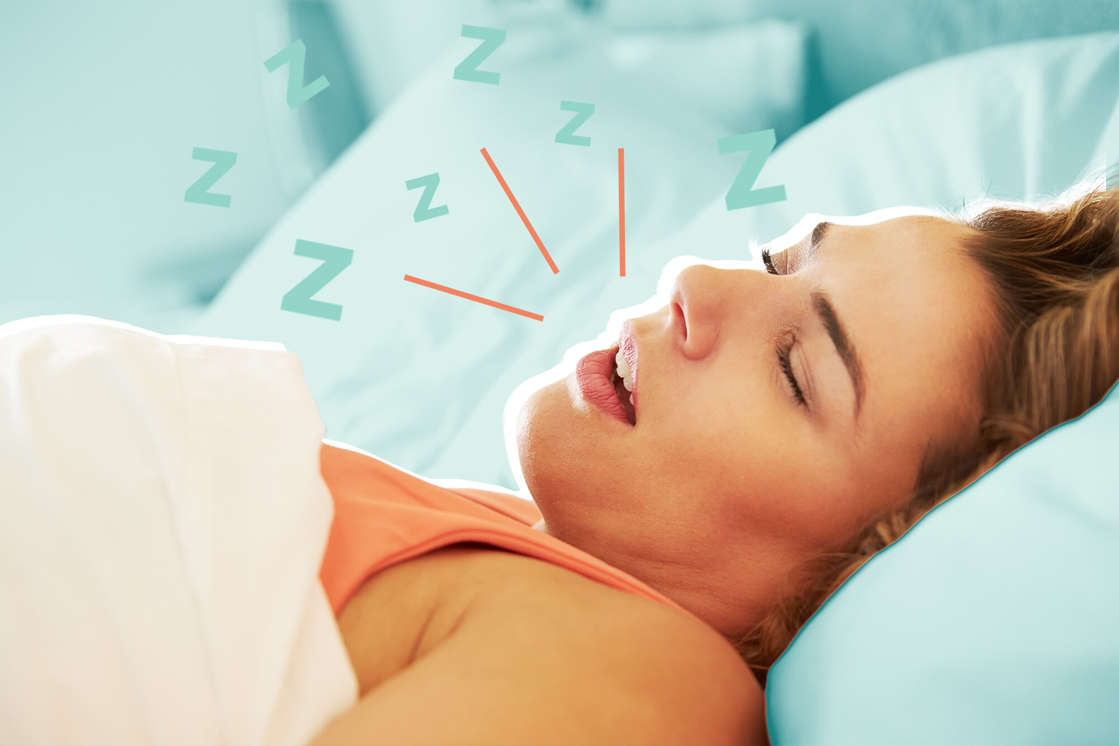How to Stop Snoring, According to Sleep Experts

Whether a light hum or a loud rustle, almost everyone knows someone who snores—even if that person may be you. In fact, according to Johns Hopkins Medicine, about 45% of adults snore occasionally, and another 25% snore on a regular basis.
And while it may seem like just another part of life, it is possible to stop snoring. "Snoring is the result of air going through a partly closed or constricted airway." Alex Dimitriu, MD, double board-certified in Psychiatry and Sleep Medicine and founder of Menlo Park Psychiatry & Sleep Medicine, tells Health. The key is understanding what's causing you—or your loved one—to snore in the first place.
Snoring may be a harmless nightly disturbance, but it can also be indicative of some sleep conditions (such as sleep apnea) according to the Mayo Clinic, so it's good to look into the root cause. With that said, here are the common reasons you may be snoring, how to stop it, and when it's time to see a doctor.
Why you may be snoring
From allergies to sleep position, here's a look at the reasons you may be snoring.
Your airways are relaxed
Naturally, when a person sleeps, their muscles relax slightly, a process that can cause the airways to shrink. According to Dr. Dimitriu, there are a few factors that can make this worse. For starters, airways will close the most during rapid eye movement (REM) sleep, a stage typically occurring in the morning. Alcohol and other relaxants also loosen the muscles and can make snoring worse, adds Dr. Dimitriu.
Your airways are blocked or narrowed
Similarly, there may be certain things blocking or shrinking the airways and causing you to snore. Conditions such as sleep apnea, upper airway resistance syndrome, and a deviated septum can cause this to occur, Chelsie Rohrscheib, PhD, head neuroscientist and sleep specialist for Tatch, tells Health.
Certain physical factors may also be at play here. Steven Thau, MD, division chief of the Pulmonary and Sleep Medicine Department and the medical director of the Sleep Center, Respiratory Therapy and the PFT Lab at Phelps Hospital/Northwell Health, tells Health that having a large tongue, short or square jaw, a small mouth, enlarged tonsils, or a polyp can also block the airways.
You're experiencing a cold
If you've ever had a cold and suddenly people are saying you snore, that's completely normal. Snoring can occur due to congestion in the nose, causing you to breathe solely out of your mouth, says Dr. Dimitriu.
You have allergies
Does your snoring coincide with pollen season? As with a cold, allergies can cause congestion and eventually snoring. "Allergies can lead to snoring because they cause inflammation of the nasal passage," says Rohrschieb.
You sleep on your back
Back sleepers, gravity is not your friend when it comes to fighting snoring. According to Dr. Thau, your airways can once again become blocked and cause snoring in this position.
How to stop snoring
There is no one-size-stops-all-snoring plan. However, once you've narrowed down why you're snoring, it's much easier to make a plan to stop.
If your airway is too narrow…
If your issue is having too narrow an airway, then "nasal dilators, such as nasal strips can open up your nasal passage and reduce snoring," explains Rohrschieb.
If you have allergies…
Nasal dilators may also help people with allergies, according to Rohrschieb. In addition, she suggests trying a nasal spray, using a humidifier, and taking antihistamines before bed. Each of these options should help with allergy-caused nasal inflammation.
If you have a physical block…
If your issue stems from an obstruction such as a larger tongue or a small mouth, Dr. Thau suggests picking up an over-the-counter oral appliance that opens the passageway. However, in many instances, you will need a dentist or ear, nose, and throat doctor (ENT) to help you choose the right option for you.
If you're a back sleeper...
In theory, the advice here is as simple as "Stop sleeping on your back," but between the difficulty of changing a long-lasting habit and the lack of control you have while asleep, it's easier said than done. For anyone struggling to make the switch, Dr. Dimitriu suggests sewing a tennis ball into the back of your shirt. This step may sound extreme, but it will help you roll back onto your side whenever you land on your back during the night, and—hopefully—stop you from snoring.
Other steps you can take to reduce snoring
According to Rohrschieb, additional habits that may limit or stop your snoring include:
-
Reducing or cutting alcohol and sedative use before bed
-
Using a nose strip to keep your nasal passages more open while you sleep
-
Quitting smoking, as it irritates the nasal passage
When to see a doctor for snoring
A rule of thumb: If your snoring is loud enough to wake others in the house or even yourself, it's time to see a doctor, says Dr. Thau. He adds that the same is true if you're experiencing daytime sleepiness, nighttime palpitations or panic, changes to your executive functioning, or a very dry mouth in the morning.
A doctor can also determine if you have a sleep condition. "If you've tried the above and you're still snoring, it's important to speak with your doctor because snoring is strongly associated with sleep breathing disorders like sleep apnea," says Rohrschieb. "Up to 95% of sleep apnea sufferers snore, and snoring severity increases with sleep apnea severity." Once a doctor diagnoses sleep apnea, you can explore further treatment options.
Rohrschieb adds that a doctor can help pinpoint the exact cause of your snoring and devise a treatment plan even for people who don't have sleep apnea.
As mentioned above, in many cases, a doctor's visit is also necessary to diagnose and find treatment for physical blocks. "An ENT evaluation can help identify potential causes of obstruction and help you decide what medical or surgical options would be best," says Dr. Thau. He adds that if your tongue is causing the problem, doctors may suggest "newer technologies that use electrical stimulation to 'train the tongue' to stay forward."
The post How to Stop Snoring, According to Sleep Experts appeared first on Health

